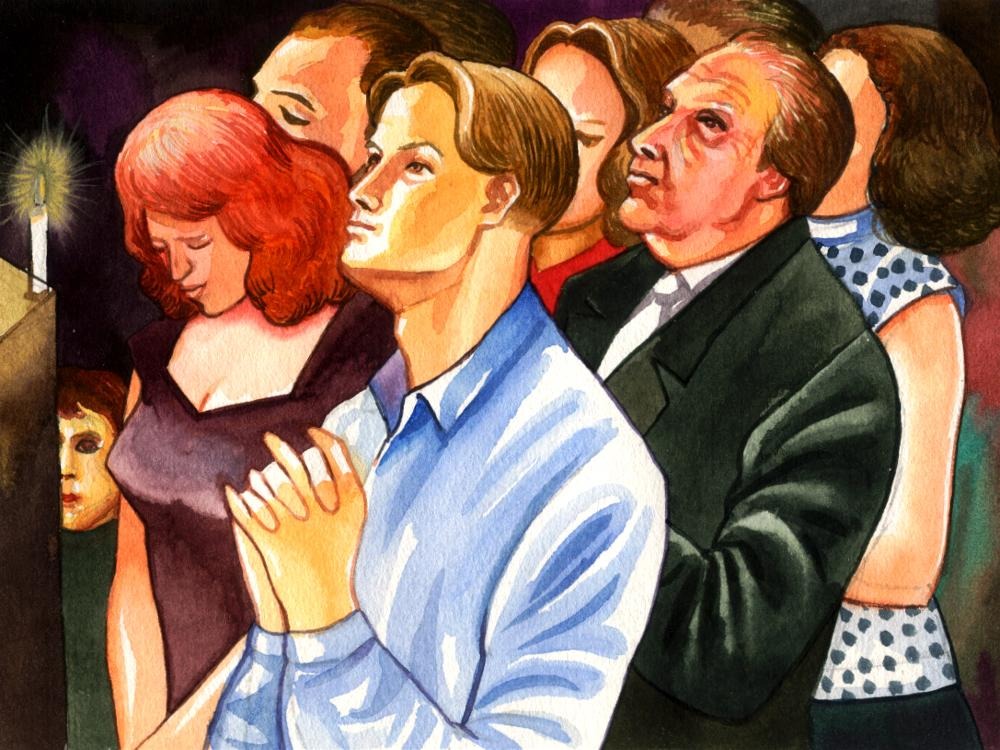Tired of God in a manmade box, religiosity, church walls that keep you from flying high, religious head-knowledge that leaves you high and dry, meaningless rituals, religious middle men con artists who your money and as they enslave you spiritually? Sick of the world and its evil negativity? Want to fly above it all? Here are some tips to help you to create your own personal God bubble, place of peaceful refuge that will help you to soar above it all and give you a personal and direct relationship with the Creator of the Universe.
Tag Archives: Church
Golden Calf Worship Among YHVH’s People Today
Are YHVH’s people still prone to golden calf worship today?
Some things never change, since human nature is still the same today as it was thousands of years ago when the children off Israel worshipped the golden calf.
So let’s explore this question.

Let’s look at the series of events that occurred as the children of Israel were leaving Egypt, which have major relevance to what is occurring in mainstream Christianity in our day. If we fail to learn the lessons of history, we’ll likely repeat the mistakes of history. It has to do with golden calf worship.
YHVH redeemed the children of Israel out of Egypt and set the slaves free. He blessed them not only by giving them their freedom, but by giving them the wealth (gold and silver) of Egypt as well. We read that the Israelites exited of Egypt with a high hand. They were victorious, free and wealthy.
YHVH led them into the wilderness en route to the Promised Land—normally an eleven day journey. They had some difficulties: Pharaoh tried to kill them at the Red Sea, they lacked clean drinking water, and they had food issues, but YHVH provided them deliverance from Pharaoh, gave them clean water, manna and meat, and they overcame these trials.
Next, YHVH led the Israelites to the foot of Mount Sinai, and on Shavuot he made a covenantal agreement with them and gave them his Torah as their national constitution. They agreed to obey him and to keep his commandments. He promised to bless them if they remained faithful to him.
Moses went up to Mount Sinai to receive the Torah-covenant on two tablets of stone. While he was gone for 40 days, the people grew worried and anxious and become weary of waiting for Moses to return. This was a test they had to pass of their faithfulness. Would they be faithful to YHVH and keep his commandments, or would they stray spiritually from the path of righteousness YHVH had given them and they had agreed to follow?
The Israelites got tired of waiting, and took the gold from Egypt and turned it into a golden calf, and then they rose up to play (to party). They even called their revelry a feast to YHVH! They used religious verbiage like “YHVH” and “feast” to add legitimacy to their Continue reading
Growing Number of Americans Love Jesus but Don’t Go to Church, Barna Finds
Can anyone relate to this? I sure can! Personally, I’m rather burned out on the traditional church service model having been in church every weekend since I was born.
I view as critically important that like-minded believers get together as often as possible—especially on the Sabbath and feasts, but not necessarily in a traditional churchy environment, which, quite frankly, isn’t really the biblical model, although there is nothing wrong with it. — Natan
From the Christian Post at http://www.christianpost.com/news/americans-love-jesus-dont-go-to-church-barna-179227/

Barna has released a report on the first of a two-part exploration of faith and spirituality outside the church, looking at the “fascinating segment of the American population who, as the saying goes, ‘love Jesus but not the church.'”
One-tenth of the population comprises those who self-identify as Christian and who strongly agree that their religious faith is very important in their life, but are “dechurched,” meaning they have attended church in the past, but haven’t done so in the last six months or more, the Barna study says, adding that only seven percent of the population belonged to this category in 2004.
More than 60 percent of the people in this group are women, and 80 percent are not millennials, between the ages of 33 and 70.
“This group also appears to be mostly white (63%) and concentrated in the South (33%), Midwest (30%) and West (25%), with very few hailing from the Northeast (13%),” the study reveals.
“This group represents an important and growing avenue of ministry for churches,” says Roxanne Stone, editor in chief of Barna Group. “Particularly if you live in a more churched area of the country, it’s more than likely you have a significant number of these disaffected Christians in your neighborhoods. They still love Jesus, still believe in Scripture and most of the tenets of their Christian faith. But they have lost faith in the church.”
What’s more, their beliefs about God are more orthodox than the general population, even rivaling their church-going counterparts, the study shows.
“For instance, they strongly believe there is only one God (93% compared to U.S. adults: 59% and practicing Christians: 90%); affirm that ‘God is the all-powerful, all- knowing, perfect creator of the universe who rules the world today’ (94% compared to U.S. adults: 57% and practicing Christians: 85%); and strongly agree that God is everywhere (95% compared to U.S. adults: 65% and practicing Christians: 92%).”
Furthermore, while they might not be comfortable with the church, this group still maintains a very positive view of religion, the study adds.
“When asked whether they believe religion is mostly harmful, their response once again stood out from the general population, and aligned with their church-going counterparts (71% strongly disagree, compared to 71% among practicing Christians and 48% among U.S adults).”
However, only 55 percent disagree, either strongly or somewhat, that all religions basically teach the same thing, much closer to the general population at 51 percent. Eighty-six percent of evangelicals disagree with the statement and believe in the distinctiveness of Christianity.
The study notes that this group falls outside of the characterization of “spiritual but not religious” folks. “But unlike practicing Christians and evangelicals, this spirituality is deeply personal—even private—with many preferring to keep spiritual matters to themselves: only two in five (18%) say they talk with their friends about spiritual matters often.”
For the study, Barna interviewed 1,281 U.S. adults via web-based surveys, in each of the 50 United States between November 4 and 15, 2016. The sampling error for this study is plus or minus 2.9 percentage points, at the 95% confidence level.
“The critical message that churches need to offer this group is a reason for churches to exist at all,” Stone concludes. “What is it that the church can offer their faith that they can’t get on their own? Churches need to be able to say to these people—and to answer for themselves—that there is a unique way you can find God only in church. And that faith does not survive or thrive in solitude.”
Yeshua on Self-Promoting, Self-Appointed Leaders and Teachers
Luke 6:40, Perfectly/fully trained. Those disciples of Yeshua the Master-Teacher who are properly trained, fit out, prepared or equipped can become like Yeshua the Master-Teacher. Those who aren’t properly equipped or trained to teach are like the blind leading the blind and will cause others to fall into a spiritual ditch (Luke 6:39).
Those who aren’t properly trained not only will be like a blind man leading the blind, but will also be hypocritical in his judgments and assessments of things. This is because he lacks the experience, wisdom and skills to be able to point out the faults of others because he is still inexperienced and has too many blind spots himself and is still like the blind leading the blind (Luke 6:41–42).
This is why Paul very carefully lays out the qualifications for those in spiritual leadership in the local congregation. A spiritual leader was not to be an inexperienced individual, a new convert or a novice (1 Tim 3:6), but well-discipled in YHVH’s truth before hand (Tit 1:9).
Paul says that it is good thing for a man to desire to be a spiritual leader (1 Tim 3:1), but it isn’t a good thing if he doesn’t meet the criteria or qualifications, which Paul then lays out (1 Tim 3:2–13).
The problem is that in our day, there are many individuals who desire to be leaders and teachers, who are self-appointed, and who have not been perfectly or fully trained. Since the advent of the internet, such people now have an easily accessible pulpit-platform from which to influence others. Sadly, they are like the blind hypocrite in Yeshua’s parable leading many astray and causing many to stumble and to fall into spiritual ditches of false doctrines and errant teachings.
Just because someone has a website, a YouTube channel, has published a book, spoken at a conference, has academic credentials or been on radio and television doesn’t mean they have been perfectly equipped or fully trained for the position of Bible teacher or a spiritual leader in the spiritual body of Yeshua.
We may not always know what a person’s background or qualifications are, but the spiritual fruit they produce, whether good or bad, can be an excellent indicator as to what type of spiritual tree they are, as Yeshua goes on to say in the next verses (Luke 6:43–45).
Those who sense a divine calling on their lives to teach or to lead YHVH’s people need to be first discipled and raised up by older and mature, wise spiritual leaders who have a proven track record of good spiritual fruit. This is the biblical way!
Are You a Shepherdless Sheep?
Deuteronomy 31:23, He gave Joshua the son of Nun a charge. YHVH is the author of godly leadership. He prepares and trains leaders and then raises them up to lead his people in the paths of righteousness leading to the spiritual Promised Land. Beware of leaders who raise themselves up and promote themselves.
What is the purpose of righteous leadership? (See Eph 4:11–12.) What are the qualifications for leadership ? (See 1 Tim 3:1–13.) What is the premise of true, Spirit-ordained leadership? (See Matt 23:11.)
Many believers have been hurt by kingdom-building, money-grubbing and self-seeking leaders in the church world and now trust no one. They pride themselves on being “independent.” Is this good?
Did Yeshua ever speak of his sheep as being “lone rangers” or did he refer to them as “a flock?” Does he ever speak of his flock as being shepherdless? Of course, Yeshua is the Chief Shepherd, but does he speaks of undershepherds as well? (Read John 10:1–18.) Is a flock that is under the guidance of a servant shepherd a place of safety or harm? Is being outside the flock a place of safety or harm? (See Matt 18:12.)
Yeshua says that those who are outside are “lost” and have “gone astray” and are in danger of perishing (Matt 18:11–14).
Are you part of a literal flock of believers, or have you spiritualized this passage away to justify your independent (rebellious?) spirit against YHVH-ordained authority?
The Local Congregation—Love and Support It or You’ll Lose It!
After pastoring a local congregation in the Hebrew Roots Movement for the past 18, I’ve recognized a serious problem. Those who have a local congregation take it for granted, while those who don’t are aching to have one. Most of those who are blessed to have a local congregation to attend weekly take it for granted and do not fully appreciate the work and sacrifice that it takes to keep a congregation going. They take it for granted. On the other hand, those aren’t blessed to have a local fellowship long for one.
Here are some things for everyone to consider in this regard.
Hebrews 10:25, Not forsaking the assembling. The broader scriptural context of this verse gives us some valuable clues about the importance of believers in Yeshua assembling together on a regular basis. What was in the mind of the writer of Hebrew that caused him to place this admonition about assembling together after his discussion about the earthy versus heavenly tabernacle, how Yeshua is our Great High Priest, and how the blood of Yeshua is much more efficacious in cleansing us from sin then the sprinkling of animal blood on the mercy seat in the tabernacle? What’s more, the writer goes on to talk about the saints boldly entering the most holy place of the heavenly sanctuary by way of the blood of Yeshua and being washed by the water of the Word of Elohim. After this, he admonishes the saints to not forsake assembling together, and so much more so as they see “that Day” (i.e., the day of Yeshua’s coming) approaching. What does all this have to do with the saints assembling together? It is this: The saints coming together (on the seventh day Sabbath, biblical feasts and any other times) should be a holy of holies experience — the nearest thing to heaven on earth this side of heaven! In as much as the holy of holy, in Hebraic thought, is a prophetic picture of the bridal chamber where YHVH will meet and spiritually commune with his people, by the saints assembling together, they are rehearsing the soon coming reunion between Yeshua and his bride (redeemed believers who love Yeshua by keeping his commandments) at his second coming. This is the larger context behind the admonition to “not forsake the assembling of ourselves together.”
The Benefits of Being Part of a Local Congregation
Church attendance is plummeting in America. Though roughly 85 percent of Americans claim to be Christian, only a very small percentage of these people attend church services weekly. Those who do, spend only one or two hours a week in church at the most. Even Continue reading
41 Reasons to Be Part of a Church Congregation
Church attendance is on the decline in America and the rest of the western world for a variety of reasons. Largely this is due to the rise of the religion of secularism where Elohim and the Bible are being squeezed out of modern man’s life in favor of the religion of self-worship. Me, myself and I are my god! The religion of secular humanism and self worship promises much self-fulfillment, but in the end, leaves one morally, spiritually, emotionally and psychologically directionless, empty and hopeless. The problem is that most humans are too ego-centric, selfish and prideful to admit that they need Elohim. Their hearts are hard, rebellious and prideful. Such an approach may look good on paper, but when you read the fine print, it results in despair and emptiness.
The Creator designed humans to need him, to have a relationship with him and this is largely done through spiritual community. Here are 41 reasons why everyone needs to be part of Bible-obedient, and Elohim fearing/loving church congregation. Continue reading






